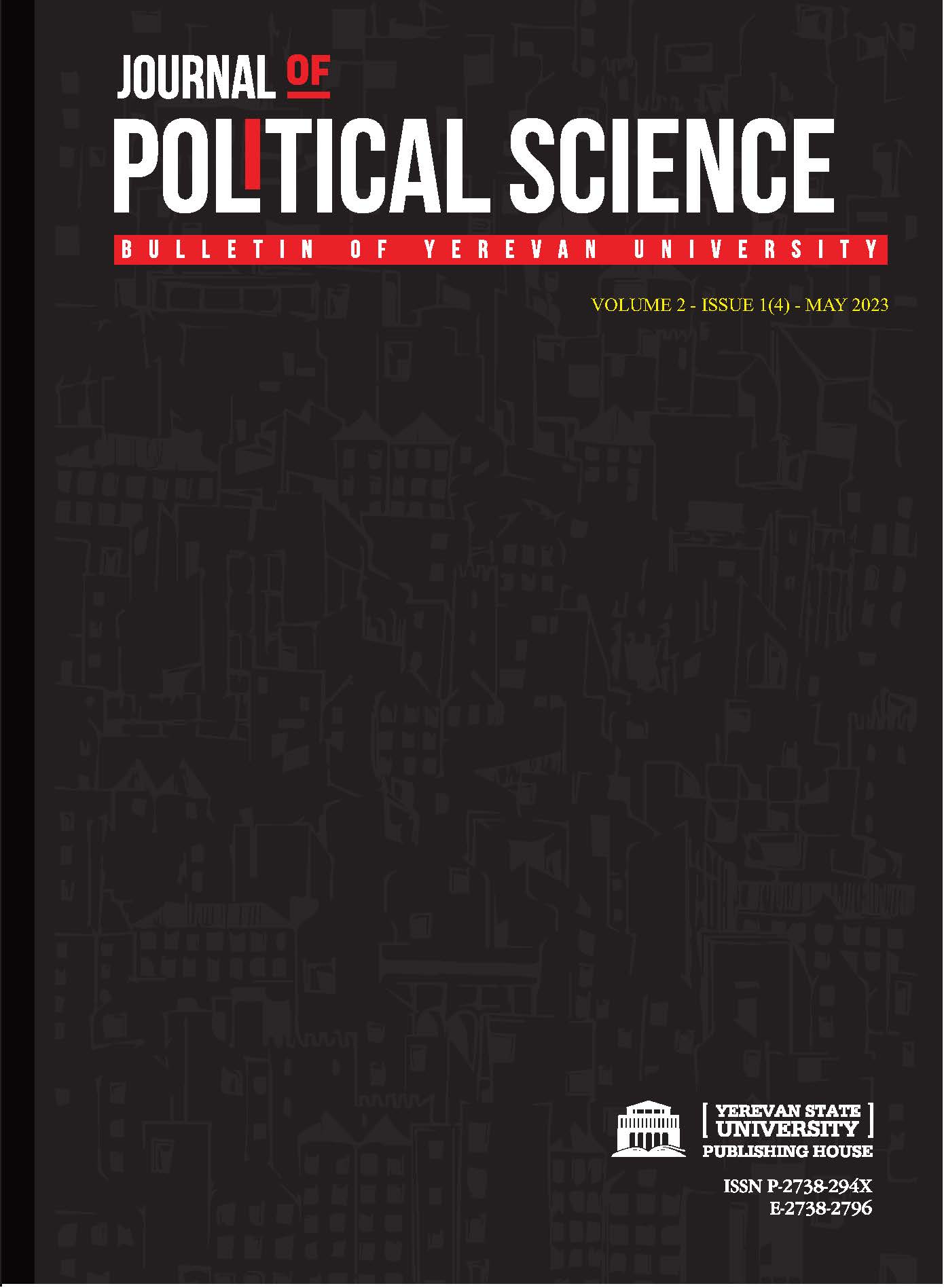Why war won and negotiations lost? Is the absence of war the same as peace?
DOI:
https://doi.org/10.46991/JOPS/2023.2.4.010Keywords:
Karabakh conflict, negotiation, war, peace, Russia, US, France, Turkey, Armenia, Azerbaijan, OSCE Minsk Group, UN Security Council, diplomatic dimensions, Armenian DiasporaAbstract
The article comparatively analyzes the systemic dependence of military victory and negotiation defeat, which is manifested in a situation of absence of war and still unsettled peace. The article examines the negotiations on the settlement of the Karabakh conflict, along with cooperation and struggle, which constitute the main form of expression of world and regional politics in the modern world.
Taking into account the genesis and changing nature of the Karabakh conflict, the author analyzes the main reasons why the negotiations on the settlement of the Karabakh conflict were not successful. In this context, the purpose of this article is to study the process of conducting international negotiations of the Karabakh conflict, its structural and functional components, to analyze the negotiation activity as a means of settling and resolving conflict situations in Nagorno-Karabakh, the implementation of international cooperation, as well as to study the main characteristics of the negotiation process between Armenia and Azerbaijan.
The author focuses on the military, political and diplomatic dimensions of the Nagorno-Karabakh conflict from 1988 to its last phase in 2020. The negotiation process to resolve the conflict in this article is considered, both in terms of their content, results and positions of their participants, as well as in terms of the procedural side of the negotiation.
References
ANG, Jennifer Mei Sze. 2020. “Revolutionary War and Peace.” In: Peace and War, edited by W. John Morgan, and Alexandre Guilherme, 117-134. Palgrave Macmillan, Cham. https://doi.org/10.1007/978-3-030-48671-6_7.
Avdaliani, Emil. 2022. New World Order and Small Regions. Palgrave Macmillan, Singapore. https://doi.org/10.1007/978-981-19-4037-8.
Babayev, Azer, and Hans-Joachim Spanger. 2020. “A Way Out for Nagorno-Karabakh: Autonomy, Secession—or What Else?”. In: The Nagorno-Karabakh deadlock: Insights from successful conflict settlements, edited by Azer Babayev, Bruno Schoch, and Hans-Joachim Spanger, 277-320. Springer VS, Wiesbaden. https://doi.org/10.1007/978-3-658-25199-4_14.
Bellamy, Alex J. 2022. The United Nations and Peacemaking. In: Contemporary Peacemaking: Peace Processes, Peacebuilding and Conflict, edited by Roger Mac Ginty, and Anthony Wanis-St. John, 83-101. Palgrave Macmillan, Cham. https://doi.org/10.1007/978-3-030-82962-9_5.
Ciută, Felix. 2007. “Narratives of Security: Strategy and Identity in the European Context.” In: Discursive Constructions of Identity in European Politics. Language and Globalization, edited by Richard C. M. Mole, 190-207. Palgrave Macmillan, London. https://doi.org/10.1057/9780230591301_10.
Cooper, Andrew, and Katherine Morris. 2013. "The Nagorno-Karabakh Conflict in Light of Polls in Armenia and Nagorno-Karabakh." In: Europe’s Next Avoidable War, edited by Sargis Ghazaryan, and Michael Kambeck, 89-100. Palgrave Macmillan, London. https://doi.org/10.1057/9781137030009_9.
Cornell, Svante E. 2017. “The Armenian-Azerbaijani Conflict and European Security.” In: The International Politics of the Armenian-Azerbaijani Conflict: The Original “Frozen Conflict” and European Security, edited by Svante E Cornell, 1-21. Palgrave Macmillan, New York. https://doi.org/10.1057/978-1-137-60006-6_1.
Coyle, James J. 2018. Russia’s Border Wars and Frozen Conflicts. Palgrave Macmillan, Cham. https://doi.org/10.1007/978-3-319-52204-3_5.
Coyle, James J. 2021. Russia’s Interventions in Ethnic Conflicts: The Case of Armenia and Azerbaijan. Palgrave Macmillan, Cham. https://doi.org/10.1007/978-3-030-59573-9.
DeBardeleben, Joan. 2011. “Revising the EU’s European Neighborhood Policy: The Eastern Partnership and Russia.” In: Russian Foreign Policy in the 21st Century, edited by Roger E. Kanet, 246-265. Palgrave Macmillan, London. https://doi.org/10.1057/9780230293168_13.
Della Sala, Vincent. 2018. “Narrating Europe: The EU’s ontological security dilemma.” European Security 27 (3): 266-279. https://doi.org/10.1080/09662839.2018.1497978.
Kertyzia, Heather. 2022. “Peace Education.” In: The Palgrave Handbook of Positive Peace, edited by Katerina Standish, Heather Devere, Adan Suazo, and Rachel Rafferty, 167-194. Palgrave Macmillan, Singapore. https://doi.org/10.1007/978-981-16-0969-5_9.
Kilroy, Richard J. Jr. 2022. “Securitization.” In: Handbook of Security Science, edited by Anthony J. Masys, 207-224. Springer, Cham. https://doi.org/10.1007/978-3-319-91875-4_11.
Kocamaz, Sinem Ünaldılar. 2022. “The EU’s Promotion of Good Governance and Democracy in the South Caucasus: Regional Strategies and Domestic Constraints.” In: EU Good Governance Promotion in the Age of Democratic Decline, edited by Digdem Soyaltin-Colella, 113-132. Palgrave Macmillan, Cham. https://doi.org/10.1007/978-3-031-05781-6_6.
Krüger, Heiko. 2010. The Nagorno-Karabakh Conflict. Springer, Berlin, Heidelberg. https://doi.org/10.1007/978-3-642-14393-9.
Lebow, Richard Ned. 2020. Between Peace and War: 40th Anniversary Revised Edition. Palgrave Macmillan, Cham. https://doi.org/10.1007/978-3-030-43443-4.
Mihr, Anja. 2021. ““Glocal” Governance in the OSCE Region: A Research Proposal.” In: Between Peace and Conflict in the East and the West, edited by Anja Mihr, 287-297. Springer, Cham. https://doi.org/10.1007/978-3-030-77489-9_16.
Mitchell, Christopher. 2022. “The Problems Peace Can Bring.” In: Confronting Peace: Local Peacebuilding in the Wake of a National Peace Agreement, edited by Susan H. Allen, Landon E. Hancock, Christopher Mitchell, and Cécile Mouly, 1-28. Palgrave Macmillan, Cham. https://doi.org/10.1007/978-3-030-67288-1_1.
Yavuz, M. Hakan, and Michael M. Gunter. 2023. The Karabakh Conflict Between Armenia and Azerbaijan: Causes&Consequences. Palgrave Macmillan, Cham. https://doi.org/10.1007/978-3-031-16262-6.
Downloads
Published
Issue
Section
License
Copyright (c) 2023 Gerard Libaridian

This work is licensed under a Creative Commons Attribution-NonCommercial-ShareAlike 4.0 International License.



